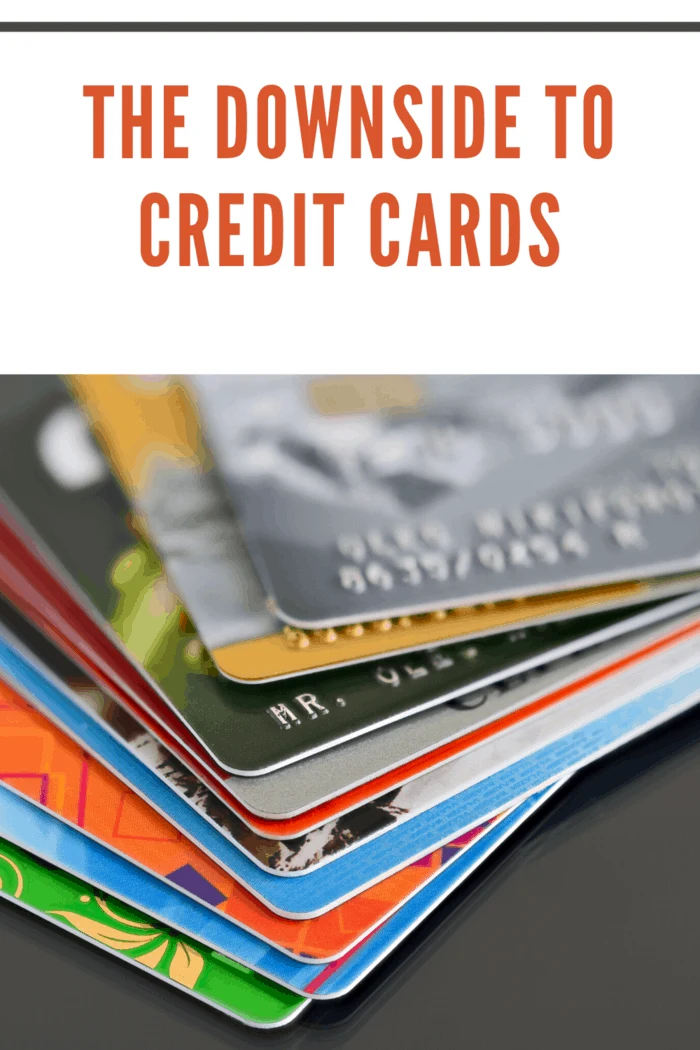It is very easy to fall into the trap of credit card debt. It can take years and cost you thousands of dollars to pay off this debt. This downside makes using credit cards risky.
Credit cards are good when you can pay them off in full when you get the monthly statement.
They can help you to build credit and give you access to funds when you need them instead of waiting for your paycheck.
However, most people do not use them in this way.

The Downside to Credit Cards
Encouraging You To Spend More
One of the biggest issues with credit cards is they give you a false sense of being able to afford more than you actually can.
You get spending power from them.
You can easily charge a purchase without giving it a second thought because the money isn’t coming out of your bank account.
It leaves you with little impact at the moment and makes it very easy to spend more than you should.
There is little to no budgeting involved, except you have a spending limit on the card.
Until a retailer turns down your card, you can keep spending, and that is what many people do.
Credit cards encourage you to spend more in several ways:
- Easy Access to Credit: Credit cards provide easy access to credit that you can use to make purchases. Unlike cash, you don’t have to physically part with your money, which can make it easier to overspend.
- Rewards Programs: Credit cards often offer rewards programs that provide incentives for spending. For example, you might earn points or cashback for each purchase you make, which can encourage you to use your card more often.
- Minimum Payments: Credit cards allow you to make minimum payments on your balance each month, which can make it easier to justify spending more than you can afford. This can lead to a cycle of debt, where you’re constantly making minimum payments but not paying off your balance.
- Interest Rates: Credit cards charge interest on any balance you carry from month to month. If you don’t pay your balance in full each month, the interest charges can quickly add up, making it even more expensive to use your card. However, the lure of being able to buy now and pay later can encourage you to spend more than you can afford.
Overall, credit cards can be a useful financial tool when used responsibly, but it’s important to be aware of the ways they can encourage you to spend more than you can afford. It’s essential to set a budget and use your credit card only for purchases you can afford to pay off in full each month.
A Huge Problem
Credit card debt is not just something you may struggle with.
According to Forbes, as of 2017, consumer credit card debt went over $1 trillion. It is a very serious issue.
The more you owe on your credit card, the more you will have to pay back in the end.
Borrowing money always comes at a cost, but these cards are notorious for having high-interest rates.
You can use other methods to borrow money, for a fraction of the cost and still be able to get money when you need it.
Tips for Credit Card Use
Here are some tips for credit card use:
- Stick to a budget: Create a budget and stick to it. Only use your credit card for purchases that you can afford to pay off in full each month.
- Pay your balance in full: Try to pay your credit card balance in full each month to avoid interest charges. If you can’t pay off your balance in full, make sure to pay more than the minimum payment to reduce your overall interest charges.
- Use rewards programs wisely: If your credit card has a rewards program, make sure you understand how it works and use it to your advantage. Choose a card with rewards that match your spending habits, and use your rewards for things you would purchase anyway.
- Monitor your account: Regularly review your credit card statement to make sure there are no fraudulent charges or errors. If you notice any unauthorized charges, report them immediately.
- Avoid cash advances: Cash advances from credit cards usually come with high fees and interest rates, so it’s best to avoid them if possible. Instead, use your debit card or withdraw cash from an ATM.
- Keep your credit utilization low: Credit utilization is the amount of credit you’re using compared to your credit limit. Keeping your credit utilization low (ideally below 30%) can help improve your credit score.
- Choose a card with no annual fee: If possible, choose a credit card with no annual fee. This can help you avoid unnecessary expenses and save money in the long run.
Remember, credit cards can be a useful financial tool when used responsibly. By following these tips, you can avoid the pitfalls of credit card debt and use your card to your advantage.
Say Goodbye to the Card
If you really want to end your relationship with credit cards, then your best bet is to find alternative options.
You can build your savings or make use of other lending solutions for emergency needs.
This will enable you to better control your debt without falling victim to it.
